Related Research Articles

Georgetown is the third oldest city in the U.S. state of South Carolina and the county seat of Georgetown County, in the Lowcountry. As of the 2010 census it had a population of 9,163. Located on Winyah Bay at the confluence of the Black, Great Pee Dee, Waccamaw, and Sampit rivers, Georgetown is the second largest seaport in South Carolina, handling over 960,000 tons of materials a year, while Charleston is the largest.

William Lloyd Garrison was an American abolitionist, journalist, and social reformer. He is best known for his widely read anti-slavery newspaper The Liberator, which Garrison founded in 1831 and published in Boston until slavery in the United States was abolished by the Thirteenth Amendment in 1865.
Spirituals is a genre of Christian music that is associated with African Americans, which merged sub-Saharan African cultural heritage with the experiences of being held in bondage in slavery, at first during the transatlantic slave trade and for centuries afterwards, through the domestic slave trade. Spirituals encompass the "sing songs," work songs, and plantation songs that evolved into the blues and gospel songs in church. In the nineteenth century, the word "spirituals" referred to all these subcategories of folk songs. While they were often rooted in biblical stories, they also described the extreme hardships endured by African Americans who were enslaved from the 17th century until the 1860s, the emancipation altering mainly the nature of slavery for many. Many new derivative music genres emerged from the spirituals songcraft.
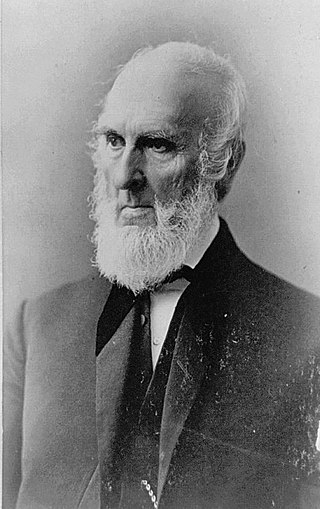
John Greenleaf Whittier was an American Quaker poet and advocate of the abolition of slavery in the United States. Frequently listed as one of the fireside poets, he was influenced by the Scottish poet Robert Burns. Whittier is remembered particularly for his anti-slavery writings, as well as his 1866 book Snow-Bound.
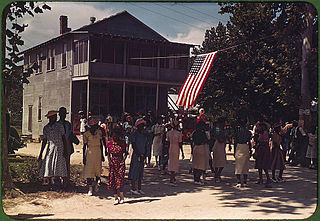
St. Helena Island is a Sea Island in Beaufort County, South Carolina, United States. The island is connected to Beaufort by U.S. Highway 21. The island has a land area of about 64 sq mi (170 km2) and a population of 8,763 as of the 2010 census. It is included as part of the Hilton Head Island-Beaufort Micropolitan Area. The island is renowned for its rural Lowcountry character and being a major center of African-American Gullah culture and language. It is considered to be the geographic influence behind the children's television program Gullah Gullah Island.
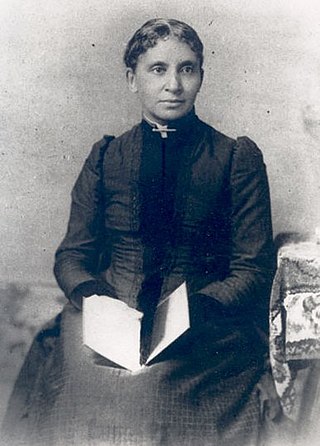
Charlotte Louise Bridges Forten Grimké was an African American anti-slavery activist, poet, and educator. She grew up in a prominent abolitionist family in Philadelphia. She taught school for years, including during the Civil War, to freedmen in South Carolina. Later in life she married Francis James Grimké, a Presbyterian minister who led a major church in Washington, DC, for decades. He was a nephew of the abolitionist Grimké sisters and was active in civil rights.

William Francis Allen was an American classical scholar and an editor of the first book of American slave songs, Slave Songs of the United States.
Charles Ware may refer to:

The term Creole music is used to describe both the early folk or roots music traditions of rural Creoles of Louisiana.

"Michael, Row the Boat Ashore" is a traditional African-American spiritual first noted during the American Civil War at St. Helena Island, one of the Sea Islands of South Carolina. The best-known recording was released in 1960 by the U.S. folk band The Highwaymen; that version briefly reached number-one hit status as a single.

Jubilee (1966) is a historical novel written by Margaret Walker, which focuses on the story of a biracial slave during the American Civil War. It is set in Georgia and later in various parts of Alabama in the mid-19th century before, during, and after the Civil War.

The Port Royal Experiment was a program begun during the American Civil War in which former slaves successfully worked on the land abandoned by planters. In 1861 the Union captured the Sea Islands off the coast of South Carolina and their main harbor, Port Royal. The white residents fled, leaving behind 10,000 black slaves. Several private Northern charity organizations stepped in to help the former slaves become self-sufficient. The result was a model of what Reconstruction could have been. The African Americans demonstrated their ability to work the land efficiently and live independently of white control. They assigned themselves daily tasks for cotton growing and spent their extra time cultivating their own crops, fishing and hunting. By selling their surplus crops, the locals acquired small amounts of property.
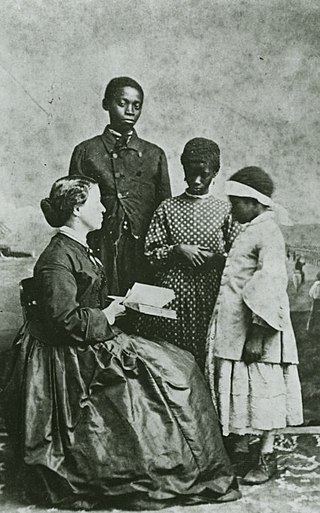
Laura Matilda Towne was an American abolitionist and educator. She is best known for forming the first freedmen's schools, notably the Penn School.

Thomas Dalton (1794–1883) was a free African American raised in Massachusetts who was dedicated to improving the lives of people of color. He was active with his wife Lucy Lew Dalton, Charlestown, Massachusetts, in the founding or ongoing activities of local educational organizations, including the Massachusetts General Colored Association, New England Anti-Slavery Society, Boston Mutual Lyceum, and Infant School Association, and campaigned for school integration, which was achieved in 1855.

Slave Songs of the United States was a collection of African American music consisting of 136 songs. Published in 1867, it was the first, and most influential, collection of spirituals to be published. The collectors of the songs were Northern abolitionists William Francis Allen, Lucy McKim Garrison, and Charles Pickard Ware. The group transcribed songs sung by the Gullah Geechee people of Saint Helena Island, South Carolina. These people were newly freed slaves who were living in a refugee camp when these songs were collected. It is a "milestone not just in African American music but in modern folk history". It is also the first published collection of African-American music of any kind.
Lucy McKim Garrison was an American song collector and co-editor of Slave Songs of the United States, together with William Francis Allen and Charles Pickard Ware.

"Rock O' My Soul", also known as "Rock My Soul", "Bosom of Abraham" or "Rocka My Soul", is a traditional African American spiritual. It was first documented by William Francis Allen, in the 1867 collection Slave Songs of the United States. Allen attributed the origin of the song to the state of Virginia and documented the following lyrics:
Seaside Plantation, also known as the Edgar Fripp Plantation, is a historic plantation house located on Saint Helena Island near Beaufort, Beaufort County, South Carolina. It was built about 1795 to 1810, and is a two-story, frame dwelling in a transitional Georgian / Federal style. It features one-story hip roofed portico. Seaside was one of the plantations participating in the Port Royal Experiment and had as its labor superintendent Charles Pickard Ware (1840–1921). Charlotte Forten Grimké (1837-1914) also resided at Seaside Plantation. Along with Tombee Plantation, Seaside is one of only a few remaining antebellum plantation houses on St. Helena. Also on the property are the contributing original, brick-lined well, a clapboard shed, a large barn with clapboard siding and tin roof, and a round concrete and oyster shell silo.
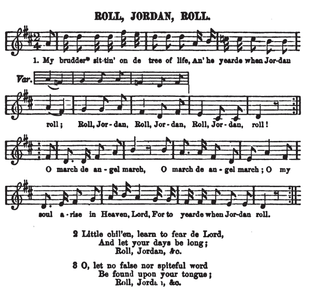
"Roll, Jordan, Roll", also "Roll, Jordan", is a spiritual created by enslaved African Americans, developed from a song written by Isaac Watts in the 18th century which became well known among slaves in the United States during the 19th century. Appropriated as a coded message for escape, by the end of the American Civil War it had become known through much of the eastern United States. In the 19th century, it helped inspire blues, and it remains a staple in gospel music.

A praise house was a type of vernacular religious architecture, typically built within the plantation complexes of the American South for the use of enslaved people who were legally bound to the property. Praise houses were a part of the early history of the black church, and there is evidence of Christian practice and praise houses from before the first organized black denominations.
References
- ↑ "Seaside Plantation, Beaufort County (S.C. Sec. Rd. 77, St. Helena Island)". National Register Properties in South Carolina. South Carolina Department of Archives and History. Retrieved 25 February 2014.
- William Francis Allen, Charles Pickard Ware and Lucy McKim Garrison, Slave Songs of the United States, 1867, New York
- Manuscript Papers of Charles Pickard Ware, ca. 1862 - 1907 resides at Howard University, Moorland-Spingarn Research Center, Washington D.C.
- Elizabeth Ware Pearson (ed), Letters From Port Royal 1862-1868, 1906, W. B. Clarke Company, Boston. (Initials C.P.W. in this book refer to Charles Pickard Ware.)